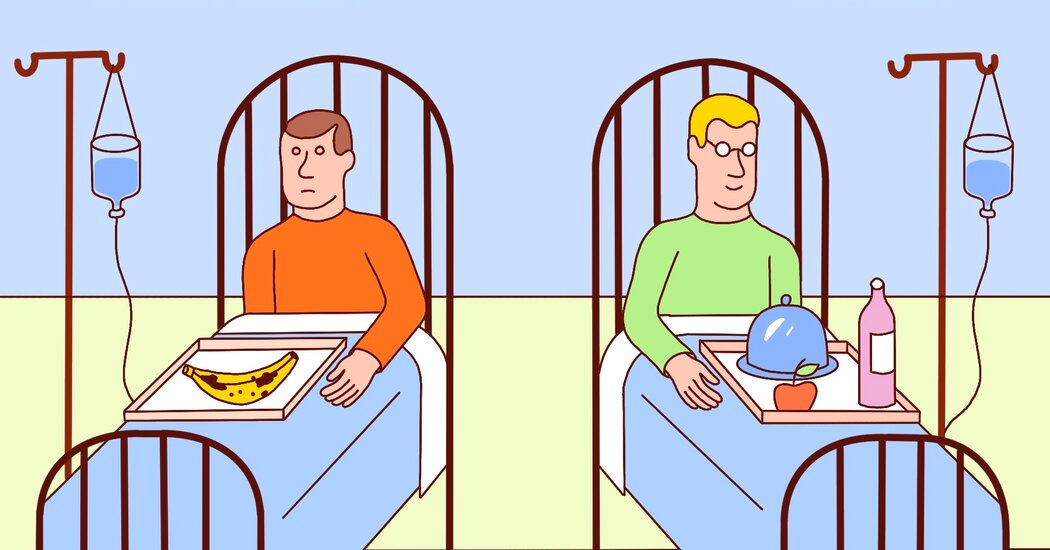For the same reason white people filled in public swimming pools with concrete when black folks started moving into the neighborhood.
I had no idea that was a thing until I found out the town I live in today, the same town that lynched an innocent black man 100 years ago, had a huge circular swimming pool in a park in the center of town that was filled in for some reason in the 1960s.
Because healthcare has been gutted and carved out by monied interests for 60+ years and they all have too much money at stake to let people just get affordable healthcare. They’re all busy skimming off the top. It’s absolutely sickening.
Yup, thank Nixon and Kaiser Permanente for pulling off one of the greatest scams in history…
We almost got there in the 90s, but the HIAA successfully nuked the whole plan. Good old Harry and Louise, fucking it up for non-corpo Americans for the past 30 years!
Article text :
By Liran Einav and Amy Finkelstein
Dr. Einav is a professor of economics at Stanford. Dr. Finkelstein is a professor of economics at the Massachusetts Institute of Technology.
There is no shortage of proposals for health insurance reform, and they all miss the point. They invariably focus on the nearly 30 million Americans who lack insurance at any given time. But the coverage for the many more Americans who are fortunate enough to have insurance is deeply flawed.
Health insurance is supposed to provide financial protection against the medical costs of poor health. Yet many insured people still face the risk of enormous medical bills for their “covered” care. A team of researchers estimated that as of mid-2020, collections agencies held $140 billion in unpaid medical bills, reflecting care delivered before the Covid-19 pandemic. To put that number in perspective, that’s more than the amount held by collection agencies for all other consumer debt from nonmedical sources combined. As economists who study health insurance, what we found really shocking was our calculation that three-fifths of that debt was incurred by households with health insurance.
What’s more, in any given month, about 11 percent of Americans younger than 65 are uninsured. But more than twice that number — one in four — will be uninsured for at least some time over a two-year period. Many more face the constant danger of losing their coverage. Perversely, health insurance — the very purpose of which is to provide a measure of stability in an uncertain world — is itself highly uncertain. And while the Affordable Care Act substantially reduced the share of Americans who are uninsured at a given time, we found that it did little to reduce the risk of insurance loss among the currently insured.
It’s tempting to think that incremental reforms could address these problems. For example, extend coverage to those who lack formal insurance. Make sure all insurance plans meet some minimum standards. Change the laws so that people don’t face the risk of losing their health insurance coverage when they get sick, when they get well (yes, that can happen) or when they change jobs, give birth or move.
But those incremental reforms won’t work. Over a half-century of such well-intentioned, piecemeal policies has made clear that continuing this approach represents the triumph of hope over experience, to borrow a description of second marriages commonly attributed to Oscar Wilde.
The risk of losing coverage is an inevitable consequence of a lack of universal coverage. Whenever there are varied pathways to eligibility, there will be many people who fail to find their path.
About six in 10 uninsured Americans are eligible for free or heavily discounted insurance coverage. Yet they remain uninsured. Lack of information about which of the array of programs they are eligible for, along with the difficulties of applying and demonstrating eligibility, mean that the coverage programs are destined to deliver less than they could.
The only solution is universal coverage that is automatic, free and basic.
Automatic because when we require people to sign up, not all of them do. The experience with the health insurance mandate under the Affordable Care Act makes that clear.
Coverage needs to be free at the point of care — no co-pays or deductibles — because leaving patients on the hook for large medical costs is contrary to the purpose of insurance. A natural rejoinder is to go for small co-pays — a $5 co-pay for prescription drugs or $20 for a doctor visit — so that patients make more judicious choices about when to see a health care professional. Economists have preached the virtues of this approach for generations.
But it turns out there’s an important practical wrinkle with asking patients to pay even a very small amount for some of their universally covered care: There will always be people who can’t manage even modest co-pays. Britain, for example, introduced co-pays for prescription drugs but then also created programs to cover those co-pays for most patients — the elderly, young, students, veterans and those who are pregnant, low-income or suffering from certain diseases. All told, about 90 percent of prescriptions are exempted from the co-pays and dispensed free. The net result has been to add hassles for patients and administrative costs for the government, with little impact on the patients’ share of total health care costs or total national health care spending.
Finally, coverage must be basic because we are bound by the social contract to provide essential medical care, not a high-end experience. Those who can afford and want to can purchase supplemental coverage in a well-functioning market.
Here, an analogy to airline travel may be useful. The main function of an airplane is to move its passengers from point A to point B. Almost everyone would prefer more legroom, unlimited checked bags, free food and high-speed internet. Those who have the money and want to do so can upgrade to business class. But if our social contract were to make sure everyone could fly from A to B, a budget airline would suffice. Anyone who’s traveled on one of the low-cost airlines that have transformed airline markets in Europe knows it is not a wonderful experience. But they do get you to your destination.
Keeping universal coverage basic will keep the cost to the taxpayer down as well. It’s true that as a share of its economy, the United States spends about twice as much on health care as other high-income countries. But in most other wealthy countries, this care is primarily financed by taxes, whereas only about half of U.S. health care spending is financed by taxes. For those of you following the math, half of twice as much is … well, the same amount of taxpayer-financed spending on health care as a share of the economy. In other words, U.S. taxes are already paying for the cost of universal basic coverage. Americans are just not getting it. They could be.
We arrived at this proposal by using the approach that comes naturally to us from our economics training. We first defined the objective, namely the problem we are trying but failing to solve with our current U.S. health policy. Then we considered how best to achieve that goal.
Nonetheless, once we did this, we were struck — and humbled — to realize that at a high level, the key elements of our proposal are ones that every high-income country (and all but a few Canadian provinces) has embraced: guaranteed basic coverage and the option for people to purchase upgrades.
The lack of universal U.S. health insurance may be exceptional. The fix, it turns out, is not.
Also if you’re quick, before NYTimes pops up it’s “subscribe” window, you can hit Ctrl-A and Ctrl-C to copy all the text from the article… which is how I got the text from my previous post.
Lol I pay for NYTimes but they consistently want me to login and hit buttons before I can read an article so I usually end up just bypassing their paywall because it is easier.
I also pay for the NYT and I just love getting full page ads multiple times in the articles I paid to read. Sometimes it’s the SAME full page ad five times in a row, just in case I missed the previous 4 copies!
We need a bot that auto replies to URL posts to certain domains with light paywalls to https://archive.is/<URL>
You can also use reader view.
Though it seems a bit trial-and-error. Scroll down a bit (so it actually loads the text) then hit the reader icon.
Take THAT!
Summarized: So why don’t they have it?
- Lack of universal coverage. The piece argues that the only solution is universal coverage that is automatic, free and basic. The current U.S. system has many pathways to eligibility and coverage, resulting in many people falling through the cracks and remaining uninsured.
- Incremental reforms are not enough. The authors argue that incremental reforms like extending coverage to more people or imposing minimum standards will not work. Over 50 years of such piecemeal policies have shown that this approach is not effective.
- Coverage is complex and uncertain. Health insurance in the U.S. is complex, with many different plans and eligibility requirements. This leads to many people losing coverage or facing the risk of losing it. Even the Affordable Care Act did little to reduce this uncertainty.
- Cost. While the U.S. spends more on health care as a percentage of GDP, only about half of that spending is financed through taxes. The authors argue that U.S. taxes are already paying for the cost of a universal basic coverage system, but Americans are not getting it.
The trouble is, none of those are the real reason, which is that the ruling class wants it to have all those “problems” because increasing the risk and cost of people changing jobs helps suppress wages.
You’d think a couple of ivy-league professors of economics would’ve figured that out. So why didn’t they mention it?
Because their arguments can be made empirically and therefore justified. Please find me a member of the ruling elite who will admit what you just proposed. No evidence, no change
Good question. I know this is an unpopular opinion but maybe… they are actual subject matter experts and you’re not?
I know, blaming a group of evil people is tempting, easier to understand and more satisfying that than a complex system of misaligned incentives grown organically through many decades of well intentioned but ineffective measures. Not that I know much about it, but, you know, conspiracy theories tend not to be true.
deleted by creator
I get the feeling we didn’t read the article in the same way. I didn’t see any excuse making for American exceptionalism at all. At the very end it points out the essential flaw that Americans are already paying for basic health care but not receiving it.
Politicians who want to do that have not been elected.
Voters who are willing to support some kind of universal coverage never materialized last time this country had a nationwide healthcare debate. And those debates don’t come around that often. Usually once a generation or so.
Many on this site might have been too young to remember. I was there. I went to the rallies and I also saw how support for universal coverage fell apart seemingly overnight. This was over a dozen years ago. Obama got elected and one of his big pushes was to reform healthcare. For years before this, everyone would always claim that they wanted universal coverage. They wanted something more akin to Europe. They wanted changed, damn it.
Then the debates started. On one side, we had well organized opposition led by right wing Republicans and funded by all manner of big businesss. This was the country’s introduction to that nutcase Palin (funny how she is almost considered sane by today’s standards). Conservatives flooded the airwaves with feel-good stories about how great out current healthcare system is while at the same time spooking voters that some kind of universal coverage would bring with it “Death Panels” and usher in communism and socialism and socialized-communism (whatever the fuck any of that is).
And it worked.
Those spook tactics had support for universal coverage almost collapse overnight. There were tons of protests in support of our current terrible system funded by Republican groups, but where were the counter-protests in support of universal coverage? POOF it vanished. I remember driving downtown with one of my buddies after work and we would find where people were gathering. It was mostly a bunch of stoners and college kids with zero direction and no cohesive message. It was a mess. We went down there a bunch of nights trying to rile up the troops but it was downright pathetic.
And except for some hotspots (like NYC) a lot of this just died down real quick. Obama was a pragmatist above all else. He could see the writing on the wall. He knew he couldn’t get the support he needed to push for some kind of universal coverage like many claimed they wanted. We were not getting healthcare like Europe and that’s all because Americans are just unwilling to lift a finger to help themselves. They are more afraid of an unknown healthcare system than the terrible one we currently have. They were willing to live with the devil they knew than the devil they didn’t know. So in the end, Obama had to settle for the system that now bares his name. It falls far from being a universal system like Europe, but even with it’s flaws, it is better than what we had before. He could still claim some level of victory.
So I am really annoyed when I see people today claiming online that we need Medicare4All or some other universal coverage. I’m annoyed, not because I disagree with those people, but rather because I know if we started up a national debate again to reform healthcare, those very same people who are adamant about needing change will sit on their asses on the toilet flipping through TikToks rather than going out there and protesting or calling their representatives or even voting for politicians who might support these reforms.
Sorry for the massively long post, but this issues triggers the fuck out of me. I’m sure zero.zero people read it.
I’m sure zero.zero people read it.
let peopleThatReadIt +=;
There are a billion middle management people and insurance execs who need to line their pockets
And guess what, if we have universal healthcare without checks and balances, hospitals will just create more middle management positions to drive up costs.
Healthcare in the US is a disaster right now, but unfortunately just having the government say they’ll foot the bill will make things worse. The bloat in the healthcare industry (as well as pharmaceutical and medical device industries) needs to be combated too.
Because people would rather pay $10 to punish other people than get $5 refunded.
It’s a gamble, too. One ICU visit would cost you more than you’d ever pay in taxes for universal health care. Insurance wouldn’t be necessary, so that $300/mo that covers your family would stay in your pocket.
BUT, there’s the tiny chance that you and your loved ones are super-human and will never have to pay for medical care beyond a cold or cough every few years. Then you can really stick that in the faces of poor people!!
It’s so stupid because people who have health insurance are handing over that money to a company where the profits help no one as opposed to the government, where the profits would help other people. It’s still a gamble.
Insurance has effects on prices that health providers charge. I wonder if that ICU visit would be as expensive if there was no game to play with insurance and they would be guaranteed to be paid. If I (a for profit corp) knew X% of my customers would only end up paying 25% of the price or less, likely after collections and/or insurance paid some, I’d probably jack my price up, too.
its funny that this article is behind a paywall
It is not complex. The GOP/Nazi party is a death cult and would prefer we die instead of providing healthcare to those that need it.
Democrats also have zero incentive or wish to actually provide universal healthcare. It’s a political football for them. I’ve been waiting 20 years for it, and then they shutdown Bernie Sanders as soon as he got close to being elected - UH was his core platform.
I almost wish it was that simple. Unfortunately it’s more about greed and the vast majority of politicians being owned by those with real power (money).
It’s not a right vs left thing it’s a right AND corporate left vs the tiny percentage of DSA Democrats that actually want to get a universal/single payer system up and running… I’m not usually a “BoTh SiDeS” guy but in this case it absolutely is. We have a LOT of shitty corporate Democrats unfortunately… The GOP is completely a lost cause though.
It’s such an uphill battle because the vast majority of BOTH parties need the
ParasiteOwning Class™ to back them, and some count on the extremely well paid board member type jobs they’re given after they serve in government. The types of jobs handed out so that they can argue they don’t accept bribes and haven’t been paid by anyone (yet…) It’s a gross loophole that really needs to be addressed.
eh, if I had the ability to be uninsured I’d take it - havent been to a doctor in decades, never needed one. but no, my employer is forced to offer insurance and I’m forced to take it. insurance companies would become insolvent in months if they didnt have a dependable revenue stream.
if I ever do need a doctor I’ll just go to the ER and forget to bring my ID - they cant refuse to provide care, after all.
if I ever do need a doctor I’ll just go to the ER and forget to bring my ID - they cant refuse to provide care, after all.
You think all they do is check ID? Really?
Hope you never contract a chronic illness. I know, I know, that will never happen because you eat right and exercise and brush your teeth three times a day.
and work out & have high muscle/low fat ratio, and live a clean life. it’s very simple to do
That will definitely ensure you avoid any genetic disorders that may be in your future. For sure.
don’t have any, other than poor eyesight. everyone in my family has glasses or has has lasik perfomed
You have no idea if you have any. Cancer can happen at any time in your life and it can be genetic. And that’s just one example.
ah, but that’s what the ER is for. and the insurance I’m forced to pay for if it’s some long, protracted cure.
Sorry… you think the ER can treat cancer? Really?
The point was you didn’t think you needed that insurance because you’re healthy. You can get cancer at any time. Good luck getting chemo treatments without insurance. You can get in a serious car accident at any time either as a driver, a passenger or a pedestrian. Good luck getting physical therapy without insurance.
The ER isn’t a solution to every ailment.
if I ever do need a doctor I’ll just go to the ER and forget to bring my ID
So a freeloader it is.
sure, I mean, I haven’t needed an ER visit yet but the opportunity is there
What if you could have free healthcare without insurance or paying any more tax than you do at the moment? Because that’s what the article is claiming should be possible.
And this is exactly why Republicans yell about people abusing the system.
so it’s okay if you’re an illegal alien but not if you’re a citizen?
Systems aren’t abused people are.
I was only a child when I learned a simple question to ask myself if something was right. What would the world/country/system be like if everyone did this? Would it make a better or worse system?
But I suppose asking that and caring about the answer would mean you’d have to care about something than yourself.
Do you return your shopping cart?
oh yeah, that’s what the cart corrals are for. sometimes I’ll collect other carts, but only on my way back to the car, I won’t go out of my way to corral the carts.
Removed by mod











